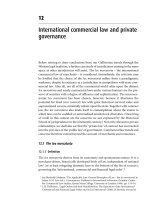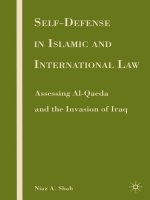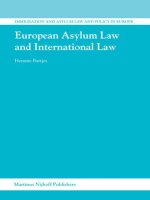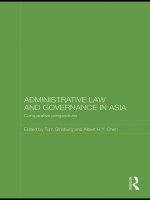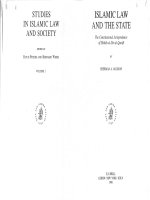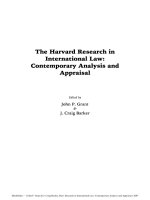RULING THEWORLD? Constitutionalism, International Law, and Global Governance pptx
Bạn đang xem bản rút gọn của tài liệu. Xem và tải ngay bản đầy đủ của tài liệu tại đây (2.39 MB, 432 trang )
This page intentionally left blank
RULING THE WORLD?
Constitutionalism, International Law, and Global Governance
Ruling the World? Constitutionalism, International Law, and Global Governance
provides an interdisciplinary analysis of the major developments and central
questions in debates over international constitutionalism at the United Nations,
European Union, World Trade Organization, and other sites of global gover-
nance. The essays in this volume explore controversial empirical and normative
questions, doctrinal and structural issues, and questions of institutional design
and positive political theory. Ruling the World grows out of a three-year research
project that brought leading scholars from around the world together to cre-
ate a comprehensive and integrated framework for understanding international
constitutionalization.
Ruling the World is the first volume to explore in a crosscutting way con-
stitutional discourse across international regimes, constitutional pluralism, and
relations amongtransnational and domestic constitutions. The volume examines
the fundamental assumptions and critical challenges in contemporary debates
over international constitutionalization.
Jeffrey L.Dunoff is Professor of Law and Director of the Institute for International
Law and Public Policy at Temple University Beasley School of Law. In 2008 and
2009, he was the Nomura Visiting Professor of International Financial Systems
at Harvard Law School. During 2007 and 2008, he served as a Senior Visiting
Research Scholar in the Law and Public Affairs Program at the Woodrow Wilson
School at Princeton University and, in 2005, as a Visiting Fellow at the Lauter-
pacht Research Centre for International Law at Cambridge University. Dunoff is
coauthor (with Steven Ratner and David Wippman) of the leading textbook Inter-
national Law: Actors, Norms, Process, and his writings have a ppeared in journals
such as American Journal of International Law, European Journal of International
Law,andJournal of International Economic Law.
Joel P. Trachtman is Professor of International Law at The Fletcher School of Law
and Diplomacy a t Tufts University. From 1998 to 2001, he was Academic Dean
of the Fletcher School, and, during 2000 and 2001, he served as Dean ad interim.
In 2002, he was Manley O. Hudson Visiting Professor of Law, and in 2004 he
was Nomura Visiting Professor of International Financial Systems at Harvard
Law School. The author of more than seventy scholarly publications, Professor
Trachtman is a member of the boards of the American Journal of International
Law, European Journal of International Law, Journal of International Economic
Law,andSingapore Year Book of International Law. Prior to joining the faculty
of the Fletcher School in 1989, he spent nine years in the private practice of
international commercial law in New York and Hong Kong.
Ruling the World?
Constitutionalism, International Law,
and Global Governance
Edited by
JEFFREY L. DUNOFF
Temple University Beasley School of Law
JOEL P. TRACHTMAN
Fletcher School of Law and Diplomacy, Tufts University
CAMBRIDGE UNIVERSITY PRESS
Cambridge, New York, Melbourne, Madrid, Cape Town, Singapore,
São Paulo, Delhi, Dubai, Tokyo
Cambridge University Press
The Edinburgh Building, Cambridge CB2 8RU, UK
First published in print format
ISBN-13 978-0-521-51439-2
ISBN-13 978-0-521-73549-0
ISBN-13 978-0-511-65132-8
© Cambridge University Press 2009
Information regarding prices, travel timetables, and other factual information given
in this work are correct at the time of first printing, but Cambridge University Press
does not guarantee the accuracy of such information thereafter.
2009
Information on this title: www.cambrid
g
e.or
g
/9780521514392
This publication is in copyright. Subject to statutory exception and to the
provision of relevant collective licensing agreements, no reproduction of any part
may take place without the written permission of Cambridge University Press.
Cambridge University Press has no responsibility for the persistence or accuracy
of urls for external or third-party internet websites referred to in this publication,
and does not guarantee that any content on such websites is, or will remain,
accurate or appropriate.
Published in the United States of America by Cambridge University Press, New York
www.cambridge.org
Pa
p
erback
eBook
(
NetLibrar
y)
Hardback
Contents
Contributors page ix
Preface: International Institutions: Why Constitutionalize? xi
Thomas M. Franck
Acknowledgments
xv
PART I: WHAT IS CONSTITUTIONALIZATION BEYOND
THE STATE?
Understanding the Demand for International Constitutionalization
1 A Functional Approach to International Constitutionalization
3
Jeffrey L. Dunoff and Joel P. Trachtman
Is the International Legal System a Constitution for International
Society?
2 The Mystery of Global Governance
37
David Kennedy
3 The International Legal System as a Constitution
69
Andreas L. Paulus
PART II: THE CONSTITUTIONAL DIMENSIONS OF SPECIFIC
INTERNATIONAL REGIMES
The United Nations
4 The UN Charter – A Global Constitution?
113
Michael W. Doyle
v
vi Contents
5 Rediscovering a Forgotten Constitution: Notes on the Place
of the UN Charter in the International Legal Order
133
Bardo Fassbender
The European Union
6 Reframing EU Constitutionalism
149
Neil Walker
The World Trade Organization
7 The Politics of International Constitutions: The Curious Case
of the World Trade Organization
178
Jeffrey L. Dunoff
8 Constitutional Economics of the World Trade Organization
206
Joel P. Trachtman
PART III: CROSSCUTTING ISSUES
Exploring the Relationships among International and Domestic
Constitutions
9 Human Rights and International Constitutionalism
233
Stephen Gardbaum
10 The Cosmopolitan Turn in Constitutionalism: On the
Relationship between Constitutionalism in and beyond
the State
258
Mattias Kumm
Navigating Constitutional Pluralism
11 Constitutional Heterarchy: The Centralit y of Conflict in
the European Union and the United States
326
Daniel Halberstam
12 Courts and Pluralism: Essay on a Theory of Judicial
Adjudication in the Context of Legal and Constitutional
Pluralism
356
Miguel Poiares Maduro
Contents vii
ThePuzzleofDemocraticLegitimacy
13 Whose Constitution(s)? International Law, Constitutionalism,
and Democracy
381
Samantha Besson
Index
409
Contributors
Samantha Besson, Professor of Public International Law and European Law,
University of Fribourg, Switzerland
Michael W. Doyle, Harold Brown Professor of International Affairs, Law and
Political Science, Columbia University
Jeffrey L. Dunoff, Professor of Law and Director, Institute for International
Law and Public Policy, Temple University Beasley School of Law
Bardo Fassbender, Professor of International Law, University of the Armed
Forces, Munich, Germany
Thomas M. Franck, Murry and Ida Becker Professor of Law Emeritus, New
York University School of Law
Stephen Gardbaum, ProfessorofLaw,UCLASchoolofLaw
Daniel Halberstam, Eric Stein Collegiate Professor of Law and Director,
European Legal Studies Program, University of Michigan
David Kennedy, University Professor of Law and David and Mariana
Fisher University Professor of International Relations, Brown University, and
Manley O. Hudson Visiting Professor of Law, Harvard Law School
Mattias Kumm, Professor of Law and Director Program in International and
Comparative Law, New York University School of Law
ix
x Contributors
Miguel Poiares Maduro, Advocate General, Court of Justice of the European
Communities
Andreas L. Paulus, Chair of Public and International Law, Georg-August-
University G
¨
ottingen, Germany
Joel P. Trachtman, Professor of International Law, The Fletcher School of
Law and Diplomacy, Tufts University
Neil Walker, Professor of Public Law and the Law of Nature and Nations,
School of Law, University of Edinburgh
Preface: International Institutions: Why Constitutionalize?
thomas m. franck
[I]t can feel like a project of the ut m ost seriousness and urgency to interpret the world
in constitutional terms.
–David Kennedy
“The Mystery of Global Governance”
International institutions, with a few minor and ad hoc exceptions, are firmly
grounded in treaties that establish their objectives, conditions of membership,
and internal and external operational parameters. These treaties are binding
on their party members and, perhaps – in the instance of near-universal
organizations – also on nonmembers.
It could be argued that it little matters whether such an institution’s foun-
dational instrument is regarded as a constitution. Yet leading thinkers, such
as the authors of this volume, seem to think the issue is worth serious exami-
nation. They express strongly held views as to why the issue is important and
argue that how it is answered can have a significant impact on the role and
operation of leading international organizations.
An international organization grounded in a constitution, they belie ve,
has a different gravitas from the many purely ad hoc reciprocal arrangements
made for the passing convenience of states.
The authors of these chapters do not merely note the phenomenon of
greater gravitas but also explore how constitutionalization affects the practice
of an institutionalized system of cooperation. For one thing, it determines
how the institution absorbs the need for change. Whereas a constitutionally
based system accommodates and adapts to its own practice, lesser consensual
arrangements tend to insist on strict literal construction of their terms and
resist their transformation through interpretative practice.
In other words, the way the institution created by a constitutional treaty
is authorized to operate can be affected by the way it actually discharges
xi
xii Preface
its responsibilities in practice. Consistent patterns in institutional practice
may affect the ambit of the institution’s jurisdiction and its modus operandi.
Other more purely functional cooperative arrangements, when based on a
treaty, are literally tied to the text that establishes their mandates.
One need but examine the evolving scope of jurisdiction exercised by the
UN Security Council to see how the Charter’s license, set out in article 2(7),
to deal with matters not “essentially within the domestic jurisdiction of any
state” has e volved and broadened in practice. Who, in 1945, would have
thought that this jurisdictional formula could evolve to authorize collective
military intervention in situations such as racism and anarchy occurring
solely within a single state? Yet when it came to dealing with apartheid
in Southern Rhodesia and South Africa or social anarchy in Somalia, the
Charter, in the practice of the principal org ans of the United Nations, has
been definitely construed to permit intervention. This has been based not on
a strict reading of text but rather on a clearly defining, gradually accruing
body of institutional practice. Because the UN Charter is widely recognized
as constitutional in nature, such adaption in practice is treated as inevitable.
The greater capacity of constitutionalized systems of cooperation to accom-
modate such operational evolution is the reason why keen observers of global
governance insist on the “constitutionalization paradigm.” There is, how-
ever, another valid reason for such insistence. Constitutions, in contrast to
lesser arrangements for ongoing cooperation, contain elements of checks
and balances intended to operate autonomously to prevent abuses of power
by the institution. This may take the form of resisting the incorporation of
new practices that seem to lead in erroneous directions. Precisely because
constitution-based systems are understood to be, like a tree, capable of grad-
ual growth, extra care is taken to trim the branches.
1
Constitutionalized
systems ensure that the power of organic grow th does not go institutionally
unchecked and unbalanced.
In practice, this means that constitution-based systems of cooperation are
structured to accommodate a form of separation of powers. This hallmark of
constitutionalization further distinguishes these foundational instruments
from such lesser forms of systematic cooperation as bilateral treaties and
memoranda of understanding.
In the instance of the UN Charter, chapters 4, 5, 10, and 14 set out,
respectively, the jurisdictional parameters of the General Assembly, Security
Council, Economic and Social Council, and International Court of Justice.
1
The expression “living tree” was first applied to describe the constitutional capacity for
organic growth in Edwards v. Attorney-General for Canada, [1930] AC 124 (PC), at 136
(Lord Sankey).
Preface xiii
Besides these black-letter texts, the constitutionally based institutions reg-
ularly refer to institutional practice to legitimate the evolving delineation
that separates and coordinates the inevitably overlapping jurisdictions of the
respective organs.
An example is the practice that has propelled the Security Council into
responsibility for administering territories in transition. This used to be an
exclusive prerogative of the Trusteeship Council and the 73(e) Committee of
the General Assembly. More recently, however, in response to the challenge
of an array of civil wars and failed states (Yugoslavia, Somalia, East Timor)
the role of intervenor has increasingly devolved to the Security Council.
Practice and text, in a constitutionally based system, are supplemented
by jurisprudence. When an institution is constitutionally based, the juris-
dictional boundaries are usually policed and sup ervised by a tribunal. In
the instance of the United Nations, this function is performed by the Inter-
national Court of Justice, which, for example, has rendered opinions as to
the respective (and overlapping) powers of the Security Council and General
Assembly,
2
and those of the Security Council vis-
`
a-vis the International Court
of Justice itself.
3
Implicit in such a constitutionalized system is the idea of judicial review,
which subordinates assumptions of institutional jurisdiction to review for
exc
`
es de pouvoir to prevent those powers given to international institutions
from incurring the self-aggrandizement that afflicts all concentrations of
power. This notion of judicial review acts as a balance to correct practices
that, if left unrestrained, would facilitate excessive jurisdictional imperialism.
A constitutionally based international organization is marke d by an institu-
tional process for determining, through “second opinions,” when a part of
the system is threatening to spin out of control.
It is the institutional capacity to limit evolutionary development through
judicial review that justifies and legitimates the capacity of constitutionally
based institutions to evolve in practice. It thus appears, par adoxically, that
the constitutionalization of international systems of ongoing cooperation
has the effect both of facilitating reform through the accommodation of
institutional practice and of containing that impetus within limits impartially
deducible from the tenor of the foundational instrument. The UN Charter
is dramatic evidence of the capacity to achieve institutional reform through
institutional pra ctice, something richly illustrated by the ensuing chapters of
2
Certain Expenses of the United Nations (art. 17, para. 2, of the Charter), (Advisory Opinion),
1962 I.C.J. Reports 151.
3
Question of Interpretation and Application of the 1971 Montreal Convention Arising from
the Aerial Incident at Lockerbie (Libyan Arab Jamahiriya v. United States), Preliminary
Objections, 1998 I.C.J. Reports 115.
xiv Preface
this book. But, the same Charter, by institutionalizing judicial review by the
International Court of Justice, also creates the opportunity and the means for
subjecting practice to scrutiny for conformity to the Charter’s foundational
parameters.
Of the several indicators of a constitutionalized system of institutionalized
cooperation among states, this may be the most functionally significant: that
it separates the respective areas of jurisdiction both among the organs of the
institution and between the institution and its member states. In making
this important move to a separation of powers, the foundational instrument,
if it is to operate as a constitution, ensures that the lines separating the
various concentrations of jurisdict ion among the institution’s organs will
be patrolled by an independent expert legal body, such as the International
Court of Justice. So will be the allocation of powers between the institution
and its members. These lines of demarcation are essential to the efficacy of
the institution, to its ability to adjust to changing priorities and issues, and
topreventitfromgrowingintoaLeviathan.
If a body like the United Nations is to retain its vitality and relevance over
many decades of changing agendas, the distribution of functions and powers
among its principal organs must be amenable to change through innovative
practice and without necessarily invoking the cumbersome process of formal
treaty amendment. The system must be capable of spontaneous regeneration
through modifications achieved by agreed practice. Yet such regeneration
must not go uncheckedand unbalanced. Tothat end, the system must be “con-
stitutional” – capable of organic growth, yet growth controlled by checks and
balances deployed by a legitimate institutional umpire. To that end, the UN
system is constitutionalized by the inclusion of a legitimate organ authorized
to render “second opinions” regarding issues of jurisdiction arising among
the principal organs and between the institution and its state members.
Thus, it is apparent that the issue of constitutionalization, which is so
thoroughly canvassed in this volume, is far from one purely of theory but
rather concerns itself profoundly with institutional efficacy. Is the institution
capable of gradual, autochthonous growth, and, paradoxically, is it capable
itself of curbing the institutional appetite for unlimited expansion of its
powers? If, as in the instance of the United Nations, the answer is “yes,”
then its architects, almost cer tainly, have written a constitution. That makes
it appropriate, as David Kennedy points out in his chapter, to think of the
project of this book “not only as description but also as program.” The point
of recognizing the UN Charter as a constitution is to unleash the institution’s
capacity to evolve while subjecting that capacity to independent review for
consistency with the institution’s stated, essential purposes.
Acknowledgments
This volume reflects the contributions and advice of many colleagues and
friends who have shared our interest in constitutional developments at
transnational sites of governance. We have been fortunate to work with
an extraordinary group of scholars, and to have enjoyed significant support
from the institutions with which we are affiliated.
Temple University Beasley School of Law generously sponsored a book
workshop in December 2007. The workshop afforded an opportunity for
authors to present their papers and receive feedback from one another, as well
as an outstanding group of experts, including Robert Ahdieh, Dan Bodansky,
Elizabeth Borgwardt, Rebecca Bratspies, Allen Buchanan, Grainne de Burca,
Orfeo Fioretos, Carol Gould, Larry Helfer, Duncan Hollis, Vicki Jackson,
R. Daniel Kelemen, Harold Koh, Andrew Lang, Peter Lindseth, Burt
Neuborne, Ger ald Neuman, Ernst-Ulr ich Petersmann, Mark Pollack, Russell
Powell, Mark Rahdert, Jaya Ramji-Nogales, Steve Ratner, Henry Richardson,
Kim Lane Scheppele, Joanne Scott, Peter Spiro, Andy Strauss, Mark Tushnet,
and Joseph Weiler. We thank each of these individuals for their thoughtful
comments and many constructive suggestions.
We are grateful to Temple Law School, and particularly to Dean Robert
Reinstein, for supporting this event. We also thank Debbie Feldman, Dimitri
Ferrell, Joel Houkom, and Dorothy Lee for theirefforts in ensuring the success
of the workshop.
Jeff Dunoff undertook research on this project while at Temple and during
appointments as a Visiting Senior Research Scholar in the Program in Law
and Public Affairs at the Woodrow Wilson School, Princeton University, and
as a Visiting Professor at Harvard Law School. He is grateful for the support
received from these institutions.
Joel Trachtman is grateful to The Fletcher School for its support during his
work on this project, and to Jeremy Leong for his superb research assistance.
xv
xvi Acknowledgments
We express thanks to John Berger and the editorial team at Cambridge
University Press for their support and guidance through the editorial and
publishing processes.
Most of all, we thank ourfamilies – Theresa, Elizabeth and Joel, and Lauren,
Hannah, Sam, and Aaron for their unflagging support of this project. They
graciously tolerated the long hours during which this volume ruled our
worlds, and we lovingly dedicate this book to them.
PART I: WHAT IS
CONSTITUTIONALIZATION BEYOND
THE STATE?
Understanding the Demand for International
Constitutionalization
1. A Functional Approach to International
Constitutionalization
jeffrey l. dunoff and joel p. trachtman
The problem of international constitutionalism is the central challenge faced by
international philosophers in the twenty-first century.
1
Introduction
This is a book about constitutional practice – and constitutional discourse –
at transnational sites of governance. For some readers, this may seem an odd
topic. As a historical matter, constitutional discourse has predominantly –
but not exclusively – occurred in the domestic legal setting. However, as
described in the essays in this volume, recent years have witnessed an intensi-
fication of constitutional discourse in many sites of transnational governance.
In response, a rapidly growing body of scholarship explores the existence and
implications of international constitutions. Drawing on insights from schol-
arship in international relations, international law, and global governance,
the essays in this volume extend earlier efforts and describe, analyze, and
advance international constitutional debates. To do so, these chapters exam-
ine the conceptual coherence and normative desirability of constitutional
orders beyond the state and explore what is at stake in debates over global
constitutionalism.
1
Philip Allot, The Emerging Universal Legal System,3Int’l L.F. 12, 16 (2001).
We are grateful to Bill Alford, Louis Aucoin, Antonia Chayes, Daniel Drezner, Michael Glennon,
RyanGoodman,Hurst Hannum, Ian Johnstone,David Luban, Gerry Neuman, Jeswald Salacuse,
Beth Simmons and Carlos Vazquez for exceptionally detailed reactions to earlier drafts. Versions
of this paper were presented at seminars or workshops at the Fletcher School of Law and
Diplomacy, Harvard Law School, Kennedy School of Government, Michigan Law School, and
the Woodrow Wilson School at Princeton University, and we are grateful to participants at these
events for useful comments and criticisms.
3
4 Jeffrey L. Dunoff and Joel P. Trachtman
This is a particularly auspicious t ime to undertake such a project. As dis-
cussed below, the enhanced salience of debates over constitutional orders
beyond the state reflects, in part, larger trajectories in international relations,
including the increased density and reach of international norms, the increas-
ing importance of new legal actors in international legal processes, and the
rise of new topics of international legal regulation – along with an increas-
ing sense that some of these developments threaten elements of domestic
constitutional structures. Furthermore, debates over constitutionalization
occur as the international community continues to adjust to the end of the
bipolar era and as questions arise over the role and status of international
norms in a rapidly changing international order. More broadly, debates over
international constitutionalization are part of broader inquiries into global
governance that are occurring in the international legal academy and in the
policy sciences more generally, including around the concepts of legal plural-
ism and new governance. Thus, this volume appears at a time of great ferment
in the highly diffuse and pluralistic processes of global governance, and at a
scholarly moment consisting , as David Kennedy notes in his contribution,
“both of great unknowing and of disciplinary reinvention.”
In this brief introduction, we do not attempt a comprehensive survey of
these diverse and complex trends. Rather, for current purposes it is suffi-
cient to outline briefly some of the most important developments that have
led to the current fascination with global constitutionalization. After situat-
ing debates over constitutionalization in this larger context, we argue that a
functional approach to questions of global constitutionalization can b e par-
ticularly fruitful at this time. As explained in more detail below, a functional
approach can provide a set of conceptual tools and inquiries that schol-
ars can use to identify and evaluate constitutional developments in various
international domains.
We posit that the distinguishing feature of international constitutionaliza-
tion is the extent to which law-making authority is granted (or denied) to
a centralized authority. We thus focus on the extent to which international
constitutions enable or constrain the production of international law. We
also provide an additional goal of international legal constitutionalization:
supplementing domestic constitutions that have been reduced in effect due
to globalization. Hence our approach is largely taxonomic, rather than nor-
mative, and we take no position in this chapter on the general utility or
desirability of international constitutionalization.
After outlining this approach to the functions of constitutionalization, we
explain how a number of mechanisms associated with constitutionalization –
including fundamental rights, direct effect, supremacy, and others – might
A Functional Approach to International Constitutionalization 5
be understood in terms of these functions. We then provide a constitutional
matrix that identifies which constitutional mechanisms are found in var-
ious international regimes and that is a tool for comparison and analysis
of different constitutional settlements. We conclude this chapter with some
brief observations regarding the relationship between constitutionalization
and constitutional pluralism, constitutional coordination, and constitutional
synthesis.
I. The Demand for International Constitutionalization
A number of contemporary developments contribute to the demand for
international constitutionalization. For current purposes, we focus on two
of these developments: globalization and the fragmentation of international
law. Although the two developments are related, and in some ways mutually
reinforcing, for ease of exposition we treat them separately in the paragraphs
that follow.
A. Globalization
Globalization is the umbrella term used to capture the enormous increase in
the flow of people, capital, goods, services, and ideas across national borders.
Several influential strands of thought suggest that pressures for international
constitutionalization are a product of globalization and the accompanying
increase in the reach and density of international legal norms. One goal of this
volume is to examine this claim critically: to what extent does globalization
drive constitutionalization in international law? In his contribution to this
volume, Joel Trachtman analyzes the causes and consequences of constitu-
tionalization at the WTO in terms of constitutional economics, focusing on
globalization’s role.
Preliminarily, we note as a descriptive matter that globalization has a mutu-
ally reinforcing relationship with certain types of international law, including
prominently those types that advance market liberalization. The relationship
is mutually reinforcing because, on the one hand, the increase in transna-
tional activities associated with g lobalization induces greater demand for
many forms of ordinary international law, including international economic
law. On the other hand, international economic law facilitates the interna-
tional flows of goods, capital, people, and ideas associated with globalization.
Other types of international law, such as human rights law or environmen-
tal law, generally do not promote globalization per se. However, these bodies
of law may expand to address regulatory concerns that arise only with global-
ization – such as concerns regarding transnational externalities or regulatory
6 Jeffrey L. Dunoff and Joel P. Trachtman
competition – or with the advance of international law aimed at market
liberalization. To the extent that international law of economic integration,
international environmental law, and at least some types of human rights
law address these types of concerns, perhaps they should be understood as
subconstitutional or ordinar y international law.
Hence, globalization expands the set of possible beneficial cooperative
arrangements. At the same time, the increased transnational interactions that
globalization enables give rise to the possibility of various forms of market or
political failure. Therefore, increased globalization may make it more valuable
for actors to enter into denser legal and institutional relationships, includ-
ing constitutionalized relationships. Indeed, there may be a dialectical rela-
tionship between globalization and constitutionalization along the following
lines: Te chnological and social change yields greater possibilities for beneficial
international interactions, including prominently international commerce,
but also including international environmental stewardship, international
cooperation to combat organized crime, and so on. International legal rules
become more valuable to realize the increased benefits of these international
interactions. Increasing demand for production of international legal rules
gives rise to increasing demand for international constitutional norms and
processes that facilitate the production of international legal rules.
B. Fragmentation
Another prominent strand of thought understands international constitu-
tionalization as a response to the fragmentation of the international legal
order. International law is the product of highly decentralized processes.
Specifically, international norms often develop in specialized functional
regimes, such as human rights, environment, trade, or international criminal
law. Each functionally differentiated area of law has its own treaties, prin-
ciples, and institutions. However, the values and interests advanced by any
particular regime are not necessarily consistent with those advanced by other
specialized regimes. In practice, specialized law making, institution building,
and dispute resolution in any particular field tend to be relatively insulated
from developments in adjoining fields, risking inconsistent judgments, con-
flicting jurisprudence, and outcomes that fail to take sufficient account of the
full range of relevant values.
Recent practice reveals several ways that conflicts can arise. Perhaps most
dramatically, different tribunals can provide conflicting interpretations of
a particular legal norm. Thus, for example, in considering whether S erbia
and Montenegro was responsible for the acts of irregular forces during the
conflict in the former Yugoslavia, the International Criminal Tribunal for
A Functional Approach to International Constitutionalization 7
the Former Yugoslavia (ICTY) considered the International Court of Justice’s
(ICJ) pronouncements regarding state responsibility in the Nicaragua case.
The ICTY determined that the ICJ’s interpretation was not a correct statement
of international law on state responsibility and articulated its own test for
determining when states are responsible for acts by irregular militias.
2
There-
after, the ICJ revisited the question of state responsibility and reaffirmed the
Nicaragua test. The ICJ found the ICTY’s interpretation to be “unsuitable”
and its arguments in favor of adopting its test “unpersuasive.”
3
Furthermore,
domestic and international tribunals can interpret the same international
norm differently.
4
Alternatively, conflicts can arise when an international body declines to
follow a general rule of international law on the grounds that a lex specialis
rule applies. A well-known example of this type of conflict occurred in the
Belilos case, where the European Court of Human Rights (ECHR) declined
to apply the general rules concerning treaty reservations and held (1) that
a state’s purported reservation to a treaty was invalid and (2) that the state
was bound by the treaty.
5
Notably, the ECHR has justified its departure
from established rules on treaty reservations by invoking the constitutional
character of the European Convention on Human Rights.
6
Moreover, conflicts can arise when disputes are considered by multiple
fora in which potentially inconsistent norms from different international
legal regimes are applicable. For example, the Chile–European Community
swordfish dispute was submitted to World Trade Organization (WTO) dis-
pute settlement and to a special chamber of the International Tribunal for
the Law of the Sea. Notably, this form of conflict is not limited to interstate
disputes; the proliferation of human rights and investment t ribunals has
enabled private parties to pursue identical or related claims in multiple fora,
either simultaneously or sequentially. Multiple litigations arising out of the
same facts raise serious efficiency and finality concerns as well as, of course,
the very real possibility of conflicting judgments.
7
2
Prosecutor v. Tadic, Case No. IT-94–1-A, Judgment, para. 145 (July 15, 1999).
3
See Case Concerning the Application of the Convention on the Prevention and Punishment
of the Crime of Genocide (Bosnia and Herzegovina v. Serbia and Montenegro) 2007 I.C.J.
91 (Feb. 26), at para. 404 (“unpersuasive”); id. at para. 406 (“unsuitable”).
4
See Sanchez-Llamas v. Oregon, 548 U.S. 331, 356 (2006).
5
Belilos v. Switzerland, 132 Eur. Ct. H.R. (ser. A) (1988).
6
See Loizidou v. Turkey, 310 Eur. Ct. H.R. (ser. A), at para. 75 (1995) (preliminary objections).
7
For a particularly notorious example of inconsistent judgments, compare Lauder v. Czech
Republic, UNCITRAL, Final Award (Sept. 3, 2001) (London arbitral tribunal finds that
state action did not constitute expropriation, did not violate obligation to provide fair
and equitable treatment, and did not breach duty to provide investor with full protection
